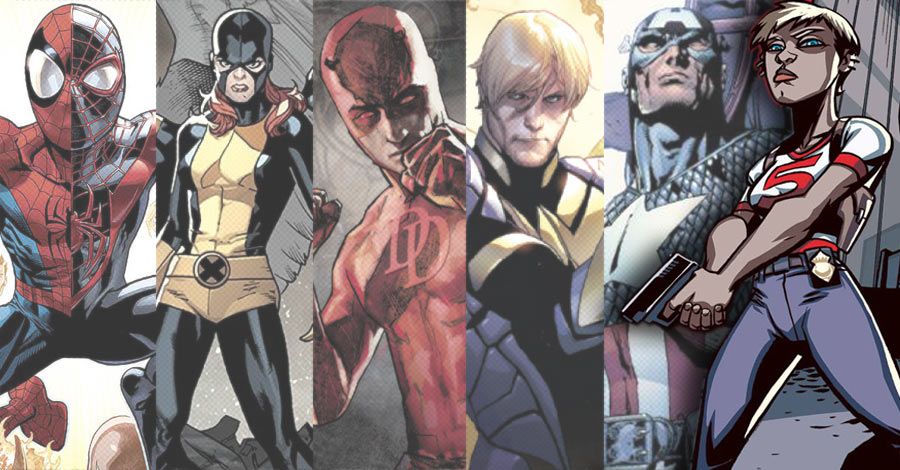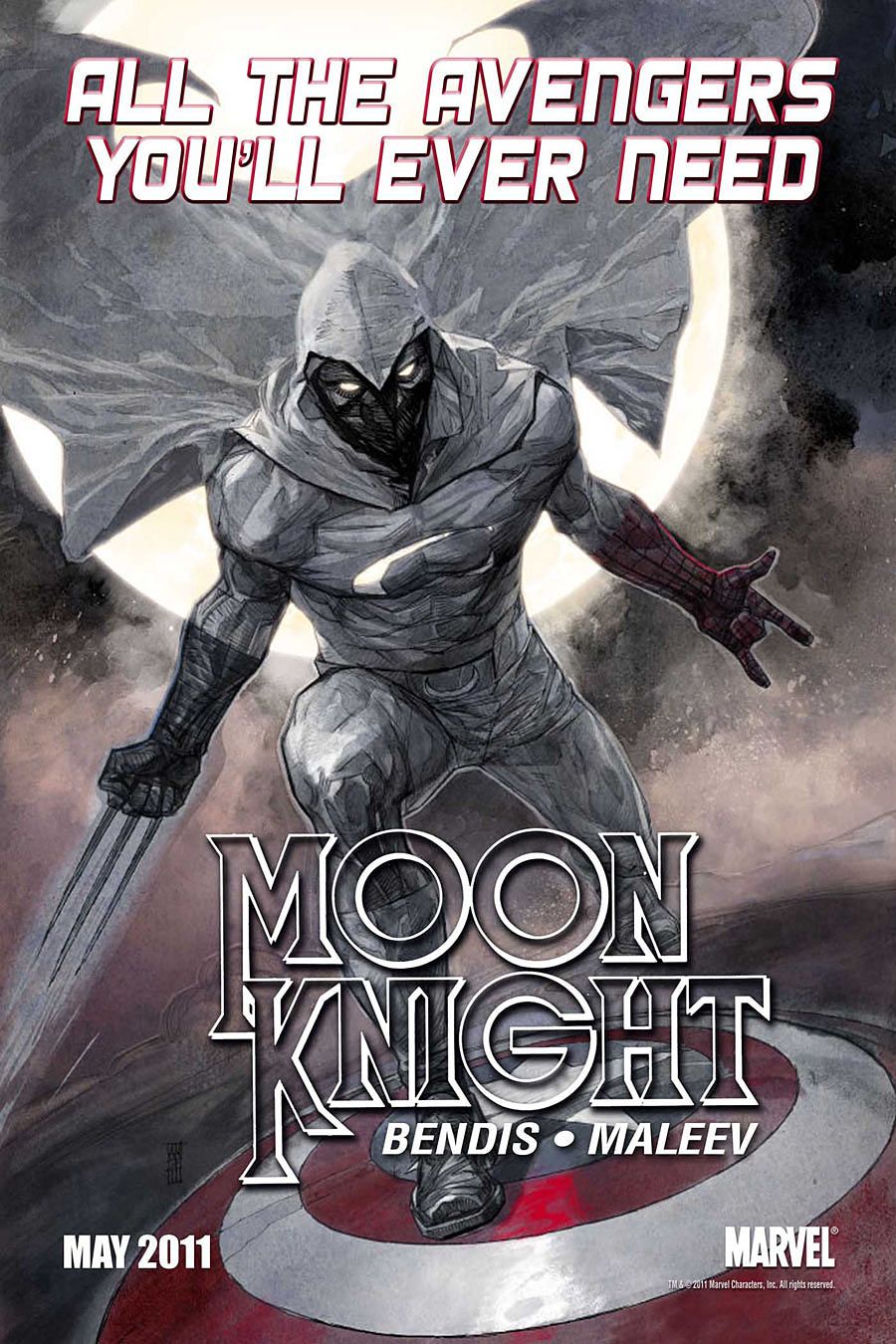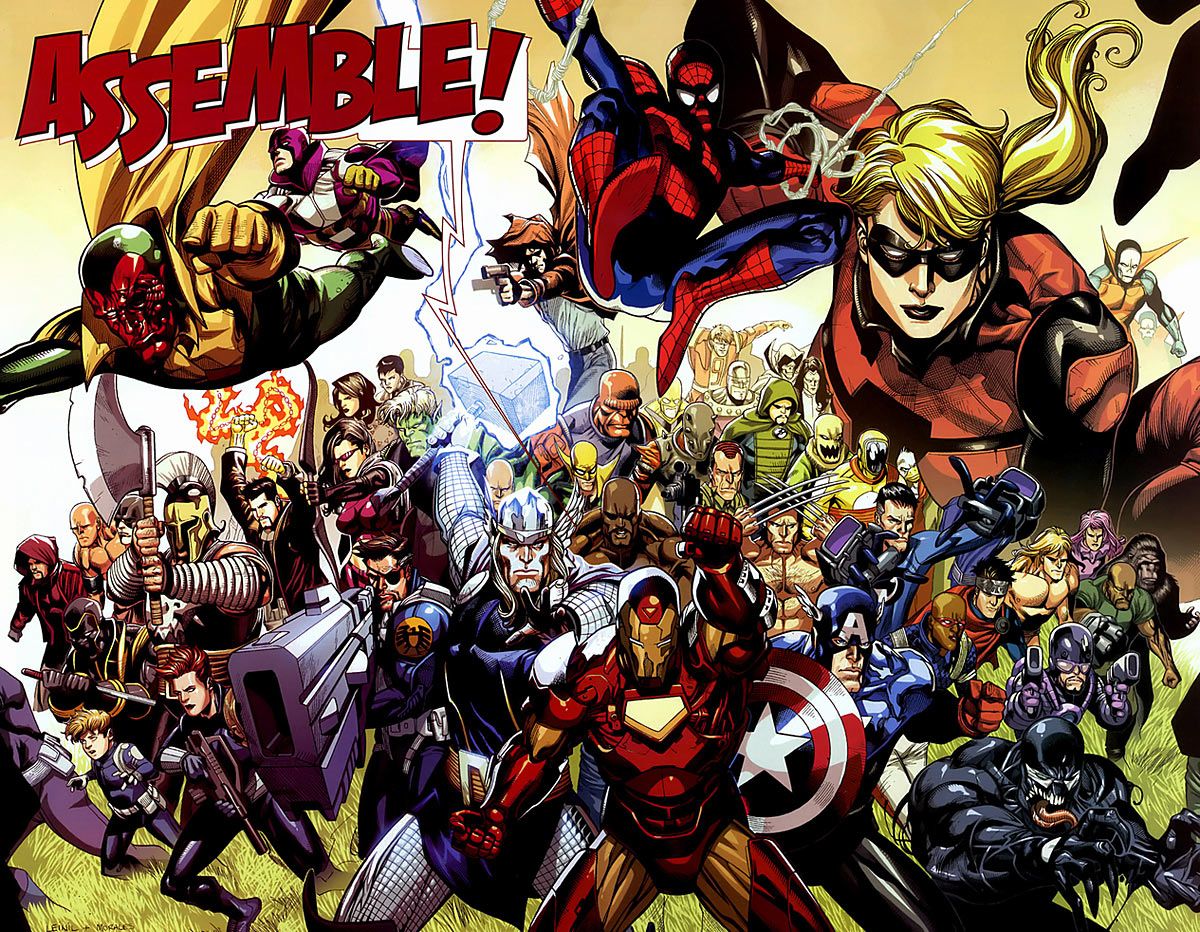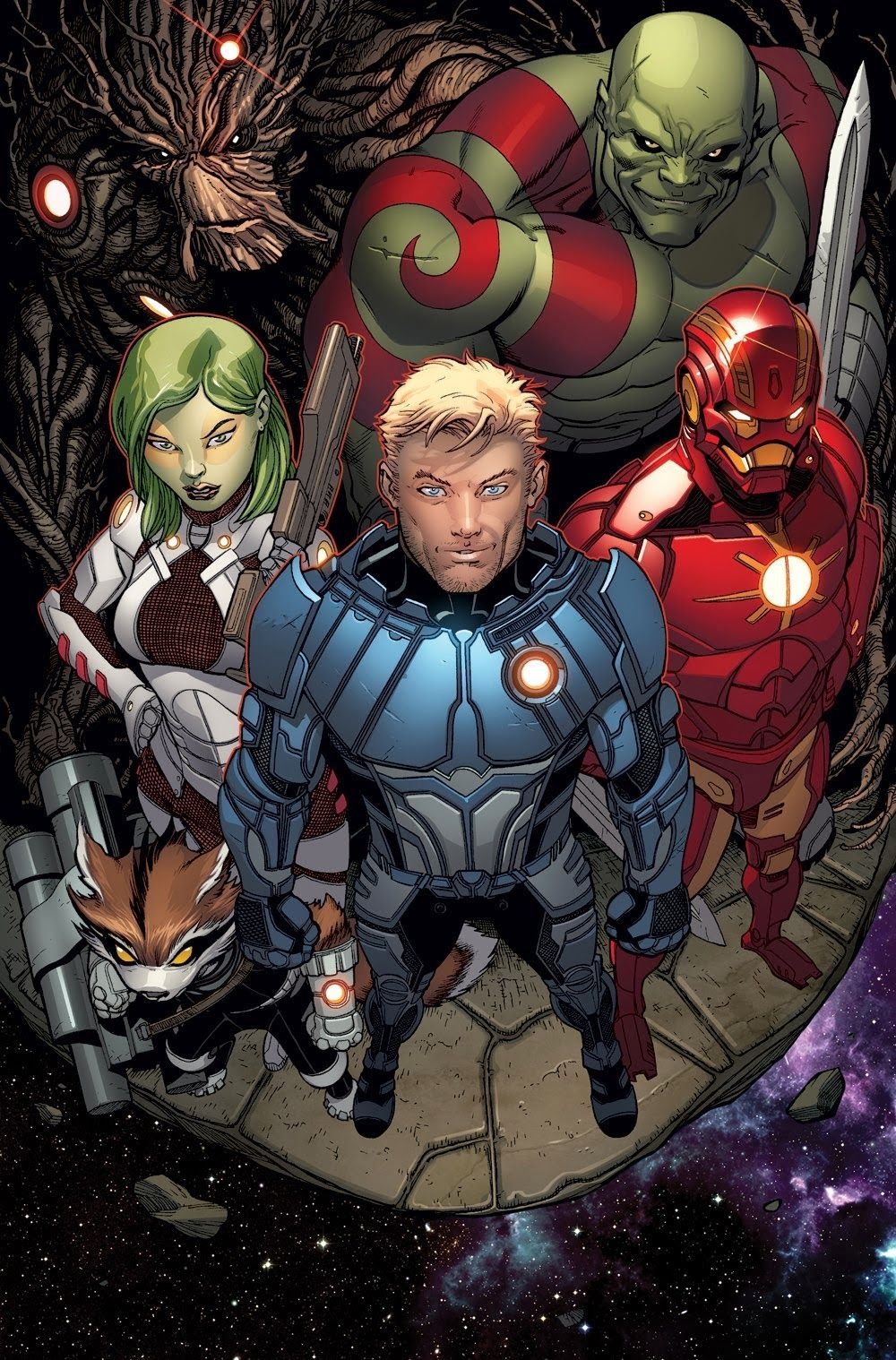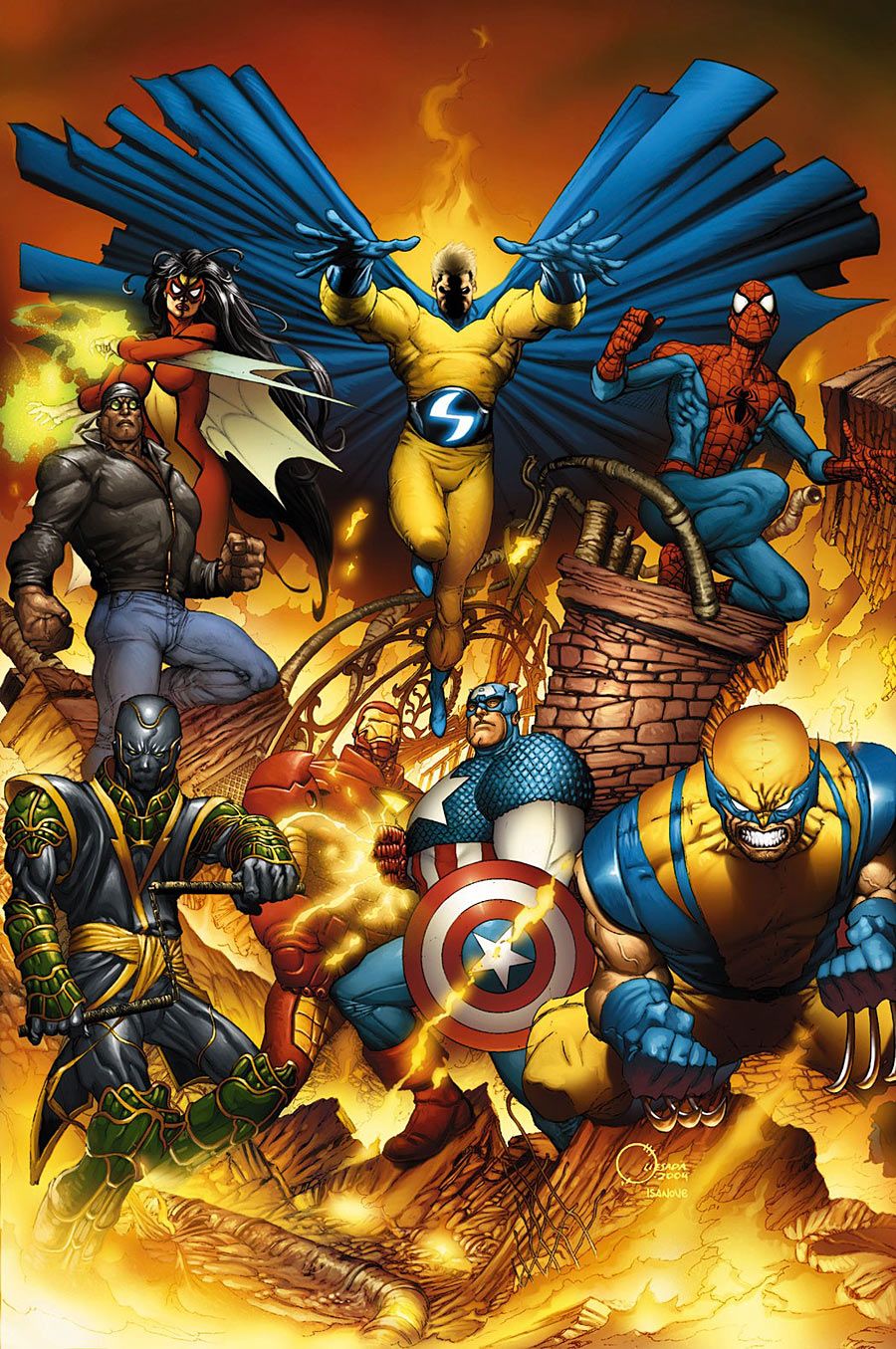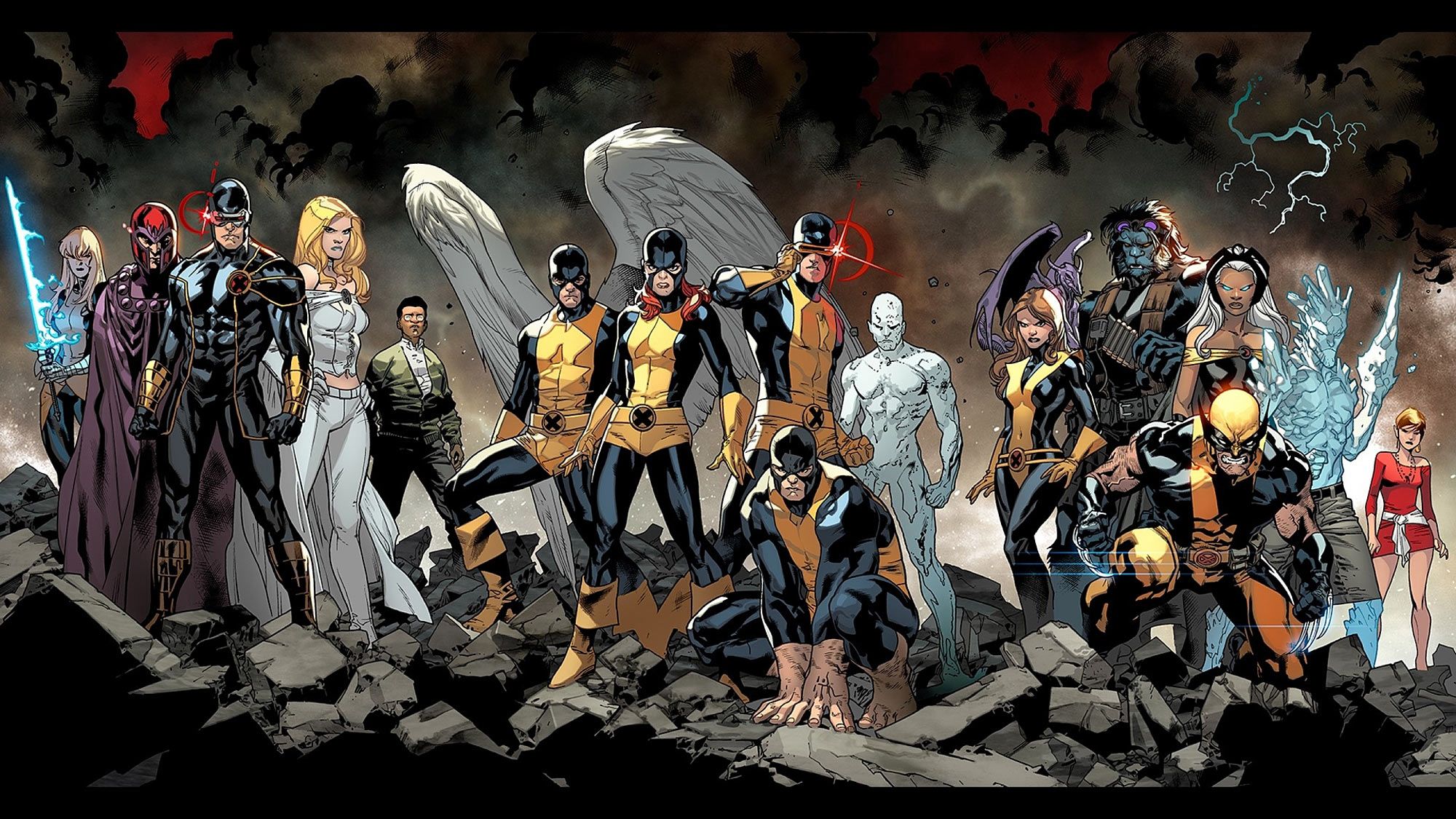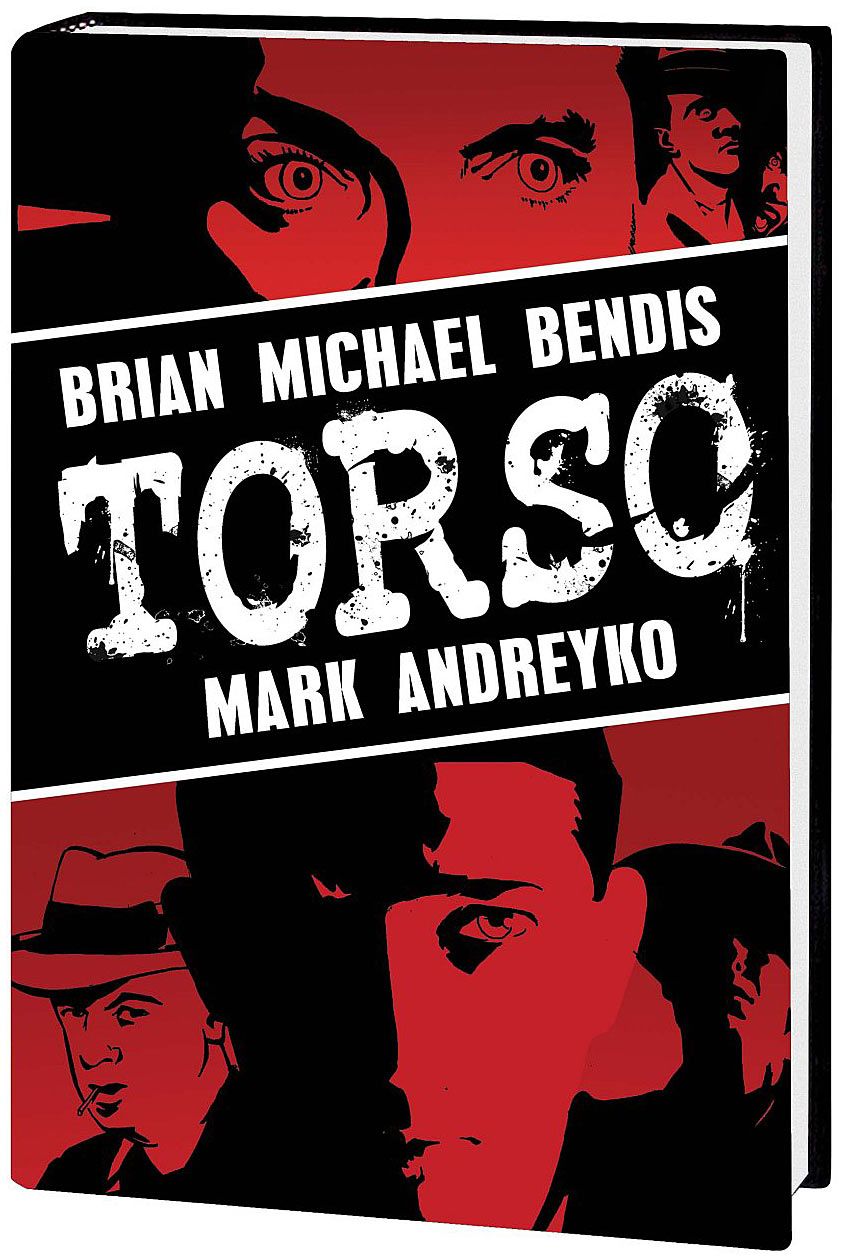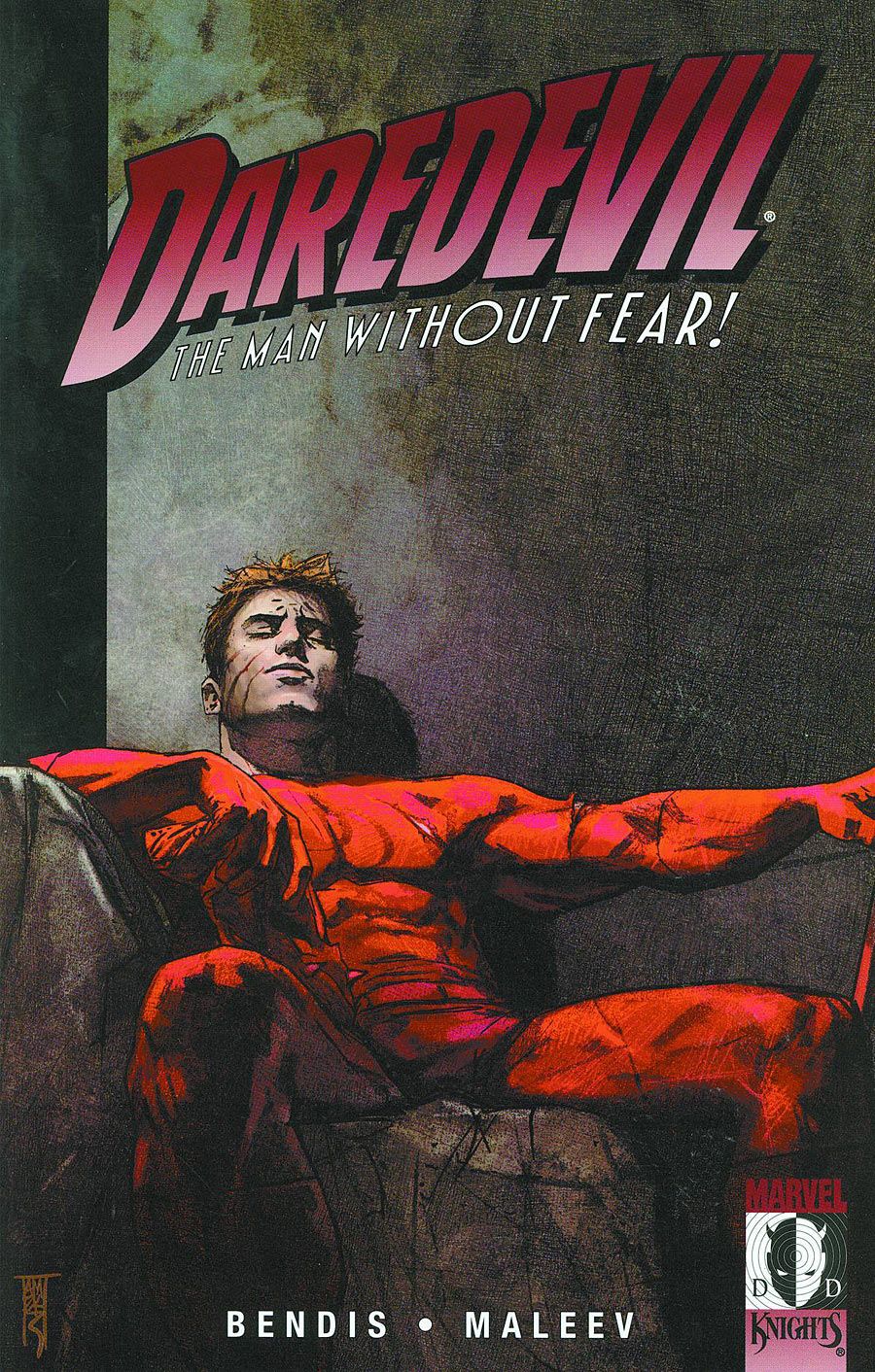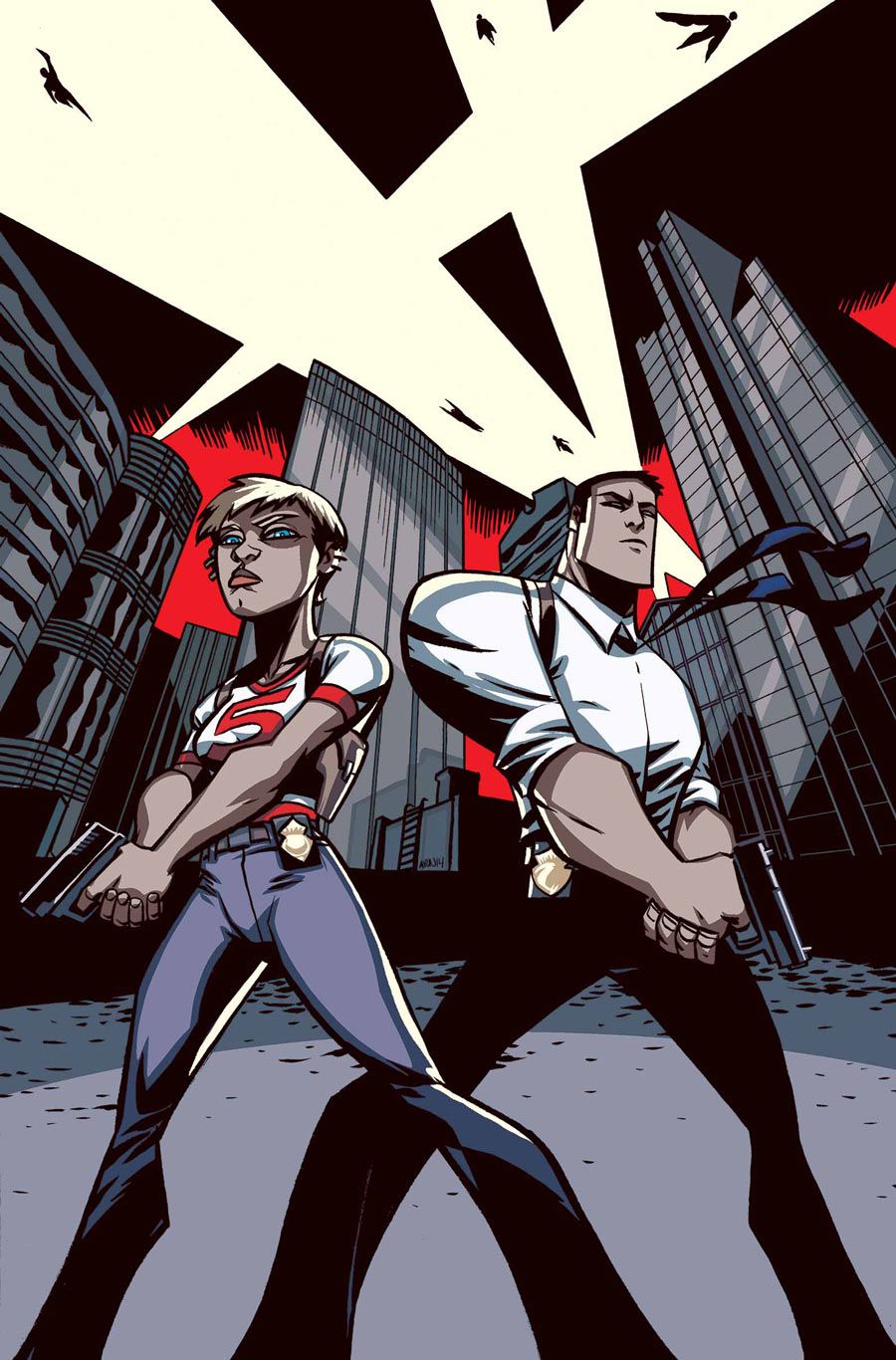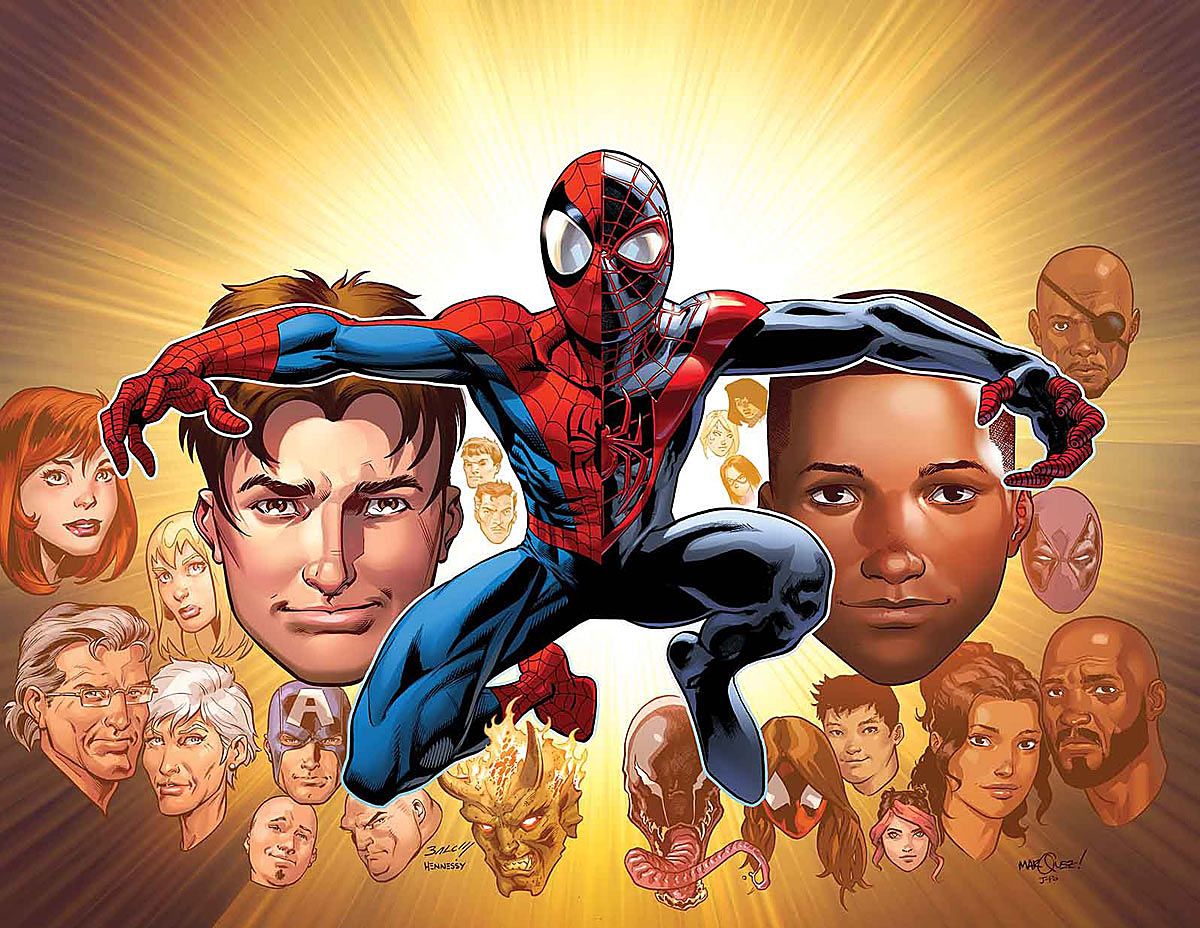It's hard to imagine a writer with more impact on the comics industry over the last twenty years than Brian Michael Bendis. From his humble beginnings crafting independent crime stories at Caliber and Image Comics, Bendis went on bring his noir-infused stylings to Marvel Comics, becoming the House of Ideas' go-to writer for long runs on major franchises like the Avengers and, more recently, the X-Men. Just about every book Bendis has touched has been a sales hit. While he is often polarizing and controversial, Bendis has earned plenty of devoted fans and carved out a niche as one of the most distinct voices in modern American comics.
Bendis Announces "X-Men" Departure with "Uncanny" #600
While his runs with Marvel's top characters have been impressive in both length and scope, he's made his name by creating original works as well. On March 10, his long running "Powers" series with Michael Avon Oeming becomes first original series to premiere on Sony's PlayStation Network, and his creator-owned output remains strong with myriad titles coming out from Marvel's Icon imprint including "Powers," "United States of Murder, Inc." and more.
Bendis Promises "Legitimate Closure" In "Ultimate End"
Bendis arrived at Marvel in 2000 with "Ultimate Spider-Man" #1, the launch of both his Marvel tenure and the alternative universe he shaped and impacted like no other creator. With "Secret Wars" bringing the Ultimate U to its "Ultimate End," CBR felt the time was right to look back on Bendis' work to date, calling out the most impactful runs from the writer's impressively diverse career.
"Moon Knight" (2011-2012)
In previous "Moon Knight" runs, Marc Spector consistently endured what might be called the ultimate identity crisis. In Bendis' twelve-issue run with artist Alex Maleev, Bendis kept the multi-personality bit but turned it on its ear by having Moon Knight's new personalities be Spider-Man, Wolverine and Captain America. Along the way, Bendis deconstructed all three characters while presenting a compelling story that reset Moon Knight for a new generation of readers. During the book's run, the writer also planted seeds for his upcoming "Age of Ultron" saga while paying tribute to Moon Knight's past villains and supporting characters. It may have been brief, but Bendis' "Moon Knight" was a loving tribute to the character's history that presented a gutsy reimagining of the tropes that made the vigilante so special in the first place.
"Secret Invasion" (2008-2009)
Intra-company crossovers are often accused of being unfocused and indulgent, forcing readers to buy more of a publisher's output to get the "full story." This was definitely not the case when Bendis and artist Leinil Yu told the epic tale of a Skrull invasion of Earth in "Secret Invasion," The event was laser-focused on the paranoia and discord an invasion by shape-shifting aliens would cause and gave Earth's heroes a unique challenge to overcome, unsure who among their ranks they could trust. When "Secret Invasion" began, it became clear that Bendis had masterfully seeded the invasion across years of previous Marvel stories. The writer's deft plotting allowed him to hide story elements in plain sight before pullin these hidden threads to reveal a wider, more intricate tapestry. "Secret Invasion" went far beyond the alien invasion, incorporating themes relevant to modern times like fear of "the other" and reimagining the Skrulls as a legitimate threat to order and safety. The invasion changed the Marvel Universe for years and remains Bendis' most successful crossover event.
"Guardians of the Galaxy" (2013-Present)
Before "Guardians of the Galaxy" became a bonafide box office smash, Brian Michael Bendis gave the world an idea of what to expect from the franchise that conquered the universe. His version of the team cut to the core of each character, but didn't settle for the status quo. Bendis' "Guardians" is a celebration of cosmic Marvel, continuing the great tradition of writers Jim Starlin, Steve Englehart, Dan Abnett, Andy Lanning, Keith Giffen and more. While the series focuses mainly on Star-Lord, Groot, Gamora, Rocket and Drax, Bendis also populated the current "Guardians" series with other Marvel icons including Captain Marvel, Iron Man and Agent Venom to give fans a thoroughly unique experience. Bendis has made the cosmic heroes an integral part of the modern Marvel Universe and done far more to keep their stories moving forward than just rest on the laurel's of the film's success.
"Avengers" (2004 -2010)
For more than seven years, Bendis guided Earth's Mightiest Heroes through unexplored realms and roster shake ups. He disassembled them, put them back together, killed them off and resurrected them. By the time it was all said and done, he had crafted the longest Avengers run of any writer in history. To begin his tenure, Bendis did the unthinkable, killing off Hawkeye and the Vision (not to mention Ant-Man/Scott Lang and Jack of Hearts). He ripped the team to shreds and put it back together in a configuration that inspired controversy -- and huge sales. Perhaps his most daring move was adding Wolverine and Spider-Man to the team, a move that remained controversial throughout his tenure. During his lengthy run, Bendis also included some of his personal favorite characters. Luke Cage, Iron Fist, Spider-Woman, Doctor Strange and Jessica Jones had never been members before, but by the time Bendis left, they were indelible parts of Avengers lore. Bendis brought Marvel's top team back to the fore, establishing them once again as Earth's Mightiest Heroes in far more than name.
"All New X-Men"/"Uncanny X-Men" (2012-Present)
Before Bendis even got his hands on the X-Men franchise, he killed Charles Xavier in the pages of "Avengers Vs. X-Men." His eventual X-run began with a conceit so insane, it could have been a disaster. Instead of taking over one of the current X-books, Bendis started fresh, bringing some "All-New" flavor with him -- by dipping into the past. Bringing the original five teenaged X-Men to the modern, post-Xavier Marvel Universe could have been a "jumping the shark" moment and a creative nightmare. Instead, it has become one of the most compelling X-Men stories in decades, with X-Men both old and new interacting and butting heads in a classic time travel tale. In addition to the time-hopping shenanigans, Bendis also turned former team leader and fallen son Scott Summers into perhaps Marvel's most compelling anti-hero. To some, the elder Scott Summers is a irredeemable terrorist; to others, he is the mutant savior. To craft a character so polarizing is a true testament to Bendis' craft. Fans have also met the hilariously named Goldballs, Benjamin Deeds, a healer named Triage and one of the most compelling new X-Men characters in recent memory, the time traveling Tempus. Like any great X writer, Bendis has built on the Children of the Atom's strong lineage, adding new characters to the ever-expanding world of the X-Men.
"Torso" (1998-1999)
with co-writer Mark Andreyko
Before he became Marvel's go-to guy, Bendis took the comic world by storm with his hard hitting crime stories. "Torso" was an Eisner Award-winning collaboration with writer Marc Andreyko that explored a serial killer in Depression-era Cleveland who left carved up, limbless torsos as his calling card. Bendis and Andreyko's protagonist was American Prohibition agent Eliot Ness, fresh off bringing down notorious gangster Al Capone. The Torso case pushed Ness to the limit and proved to the world that some evil transcends order and reason. "Torso" also proved that the then newcomer knew his way around a crime story, crafting so sharp you'll cut yourself dialogue that would soon become the his trademark. Bendis also drew "Torso," a skill that he would show the world less frequently as his writing career took off. Together, Andreyko and Bendis crafted one of the great crime comics of the late 20th Century and foreshadowed the type of stories Bendis would soon bring to "Daredevil" and "Alias" for Marvel. "Torso" holds up as chilling period examination of darkness and inhumanity in early 20th Century America and solidified Bendis as a crime writer to be reckoned with.
"Alias"/"The Pulse" (2001-2006)
In addition to launching the Ultimate Universe, Bendis also kicked off Marvel's mature readers MAX line with "Alias." The series starred an original character, Jessica Jones, who was a failed superhero turned broken, desperate private investigator looking for meaning in the seedier side of the Marvel Universe. Drawn by frequent Bendis collaborator and Jessica Jones co-creator Michael Gaydos, "Alias" deconstructed superhero comics as Jessica saw the Marvel U through the unique and exhausted perspective of a woman who had endured tragedy and was only now trying to pick up the pieces. "Alias" was controversial, it was polarizing and it grnered multiple Eisner nominations as Jessica gained a legion of fans. Jessica found meaning and purpose across her challenging journey, but the greatest obstacle came from the reimagined Killgrave, the Purple Man. Plucked from D-list obscurity, he quickly became the Marvel U's version of Hannibal Lecter.
Jessica found some semblance of peace, leaving the MAX "Alias" behind for "The Pulse," a series about investigative journalism in the mainstream Marvel U. The new series paved the way for Bendis to make her a major character in his "Avengers" titles where she married her lover and confidant, Luke Cage. The couple later had a baby girl, and despite becoming a mom Jessica remains Marvel's most foul-mouthed champion. Bendis' most enduring original Marvel creation is also the next to make the jump to live-action at Netflix as "A.K.A. Jessica Jones," the second Marvel series featured on the streaming service.
"Daredevil"
"Daredevil" (2001-2006); "Daredevil: End of Days (2012-2013)
Bendis cut his teeth in the comic industry by delivering some of the freshest crime dramas ever to hit the comic book page. When Marvel gave him the keys to "Daredevil," Bendis brought his noir sensibilities to mainstream comic readers and forever changed Matt Murdock in the process. Building on the dark and gritty streets of Hell's Kitchen established by Frank Miller and David Mazzuchelli, Bendis turned the lights even lower and did the unthinkable:, outing Matt Murdock's secret identity and shaking the foundations of the Man Without Fear's world. Along the way, readers enjoyed deep character examinations of Elektra, Typhoid Mary, Foggy Nelson and more of Daredevil's friends and allies. But it was in his portrayal of Wilson Fisk, the Kingpin of Crime, that Bendis did his best work, taking evil and corruption to a whole new level. With collaborator Alex Maleev (and occasionally David Mack), Bendis pushed Daredevil to his breaking point, bending the hero past the point of sanity and endurance. Like his father taught him, Daredevil got back up and fought.
"Powers" (2000-Present)
From Image Comics to Marvel Icon and now to PlayStation Network, "Powers" has been a rocket ride since it exploded on the scene in 2000. Bendis and Michael Avon Oeming's "Powers" is one of the most compelling superhero deconstructions this side of "Watchmen," as well as one of the greatest long running cop dramas in comic book history. "Powers" tells the story of two cops who walk the superhero beat, former superhero Christian Walker and tough as nails, foul-mouthed Deena Pilgrim, who navigate the mean streets of a city riddled with super powered drama and violence. From tense interrogations to long form mysteries that have the potential to span galaxies, "Powers" reads like a greatest hits of everything fans enjoy about Bendis. Now entering its fifteenth year with a TV series and a new #1 on the way, "Powers" shows no signs of slowing down, nor is Bendis, with Walker and Pilgrim still as complex and nuanced as they have from the beginning and no shortage of interesting cases for them to tackle. Bendis has been plying his trade on Marvel's greatest for over a decade, but the world of "Powers" is truly a testament to Bendis' ability to forge his own universe, one that continues to grow.
"Ultimate Spider-Man" (2000-Present)
When the Ultimate Universe was announced, there were many who thought it would never work. But when Bendis and long time artistic partner Mark Bagley introduced the world to a new and modern version of Peter Parker, a young and inexperienced Spider-Man, the fate of Marvel Comics shifted forever. In the throes of bankruptcy, Marvel needed a hit, and "Ultimate Spider-Man" was just that hit. The tone, pacing, characterization and the reimagining of classic Marvel characters all set a new standard for Marvel in the 21st Century. Bendis delivered a story and a character that were simultaneous very familiar and decidedly different from what fans were used to. Bendis applied the same approach to all of Spider-Man's supporting cast, building on what original creators Stan Lee and Steve Ditko introduced in the Silver Age, giving them a modern, "Ultimate" twist. For 111 consecutive issues, Bendis and Bagley delivered a compelling adventure each and every month, becoming the longest running team on a single title in Marvel history. The humor, the pathos and the action all became trademarks of "Ultimate Spider-Man," making a generation of readers fall in love with the new Peter Parker.
With "Ultimate Spider-Man" riding high, Bendis threw himself a curve ball (aided by Bagley's return) and killed off Peter Parker. But that was far from the end of Marvel's Ultimate Spider-Man. For his next trick, Bendis introduced Miles Morales, a new Spider-Man who arrived on the page fully-realized and in a few short years has become arguably as beloved by many readers as Peter. Miles, the half-Black, half-Latino Spider-Man has become a symbol of inclusion and, more importantly, heroism and sacrifice. His story has allowed Bendis to move "Ultimate Spider-Man" away from retelling old stories with new twists to fully-new stories starring a character who very much represents the next generation of heroes. In "Ultimate Spider-Man," Bendis managed to create not one, but two heroes who have set the standard for the modern age of Marvel Comics.

